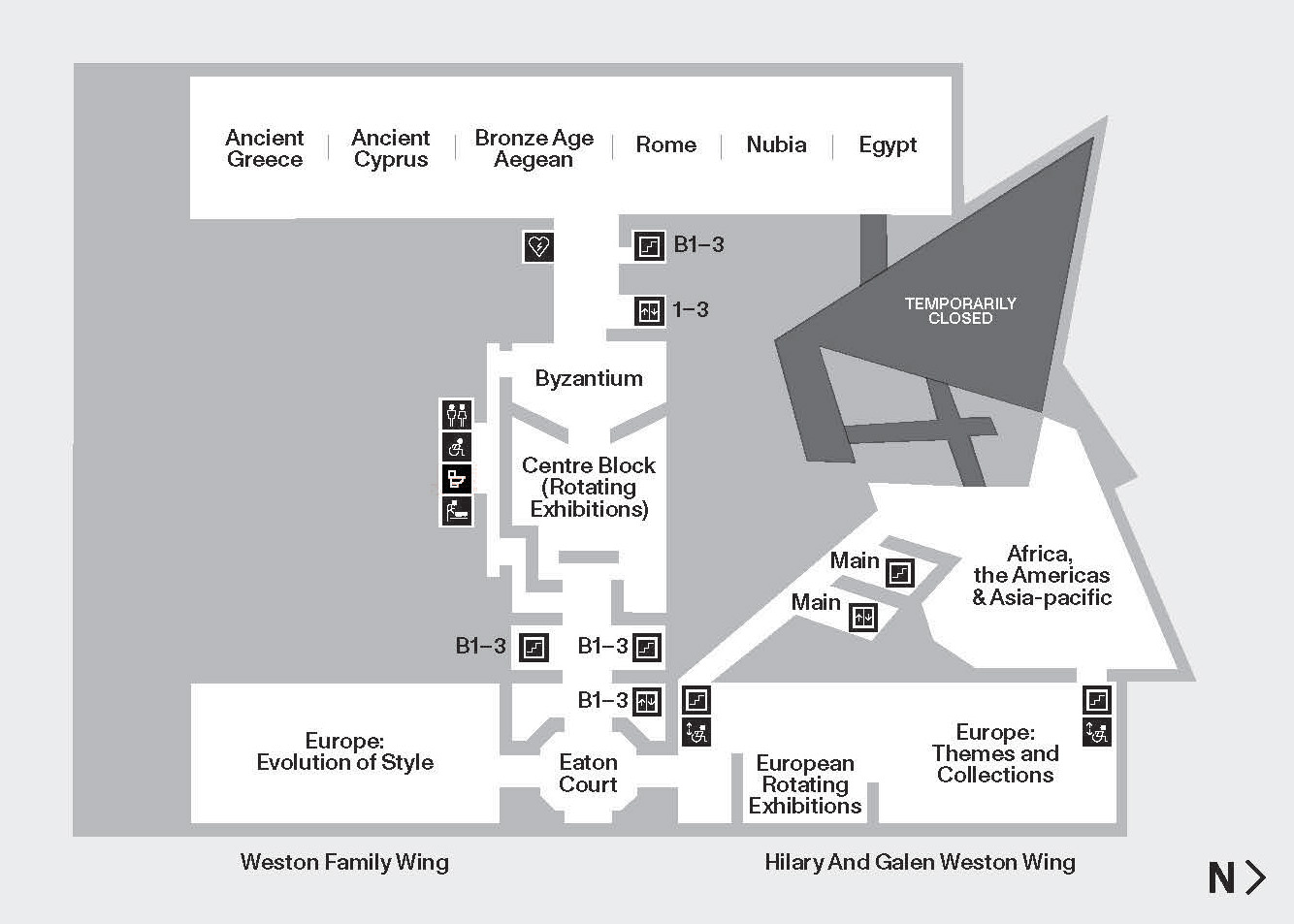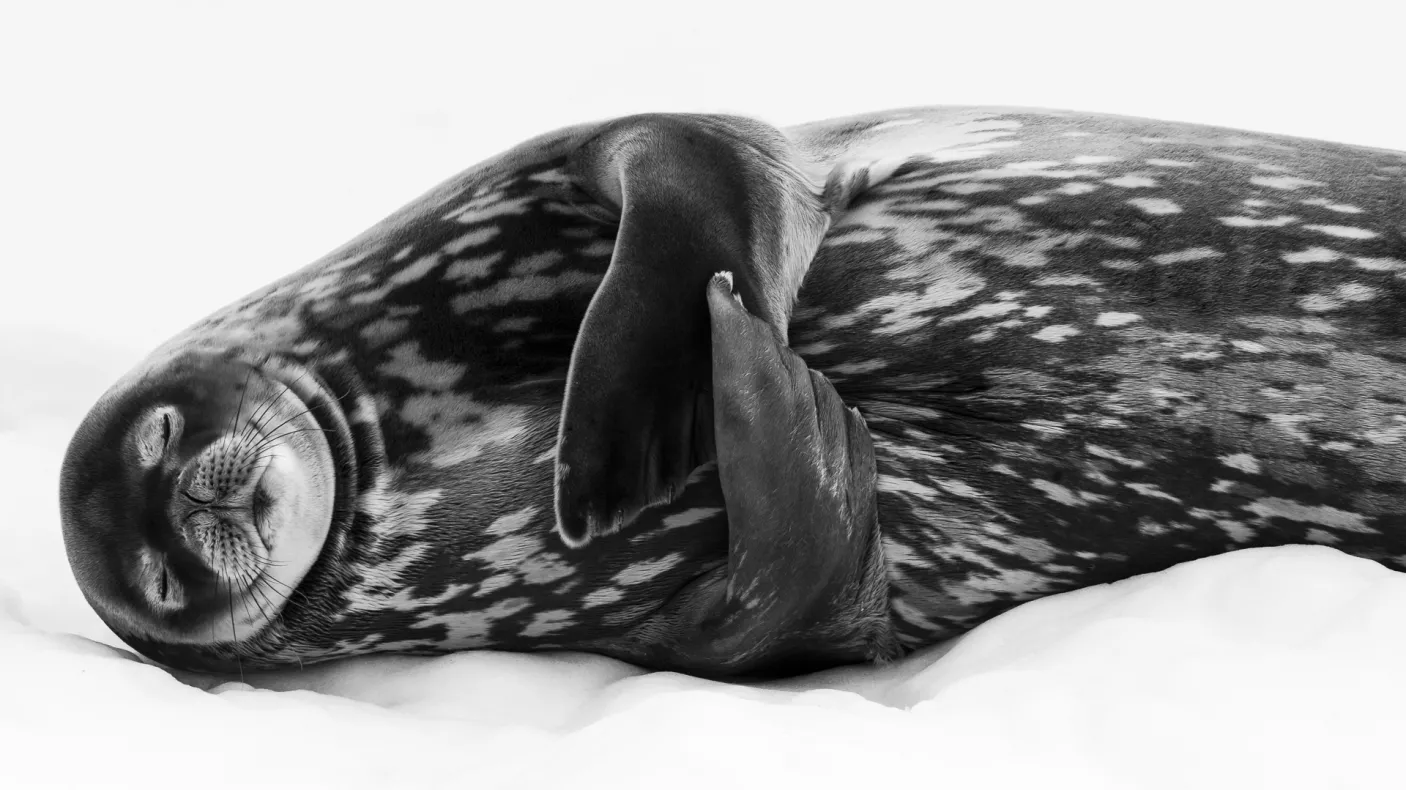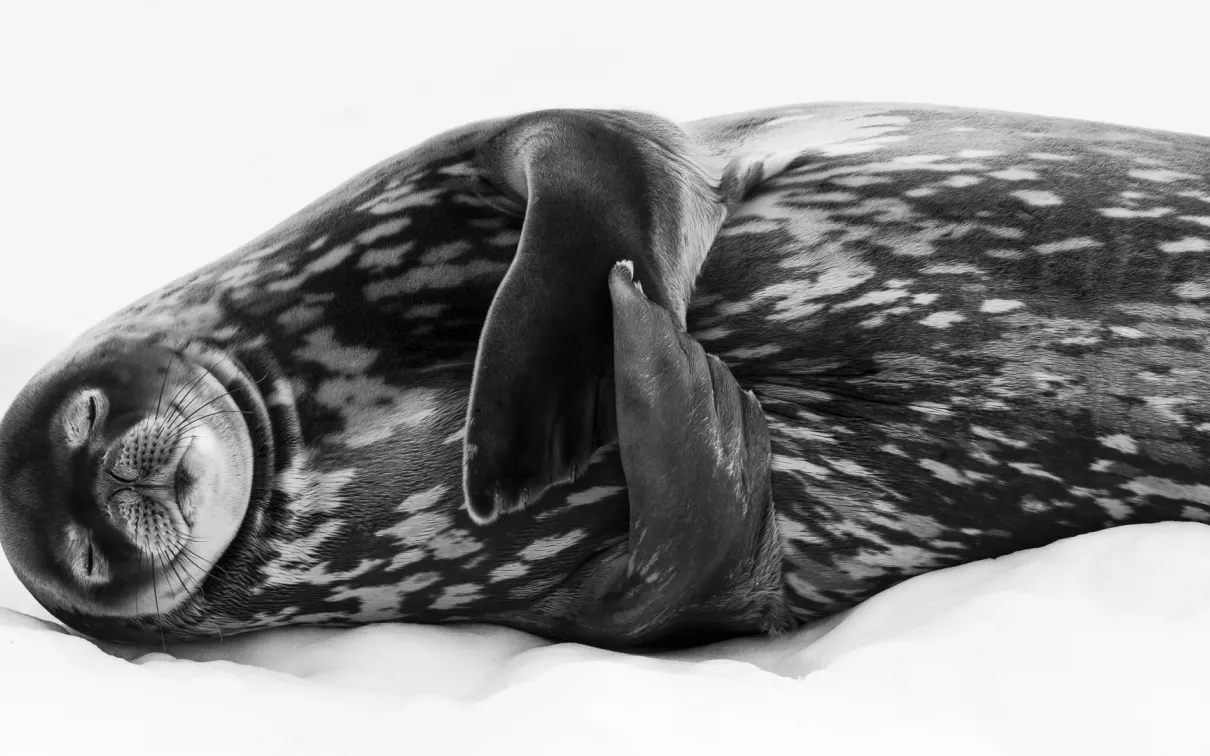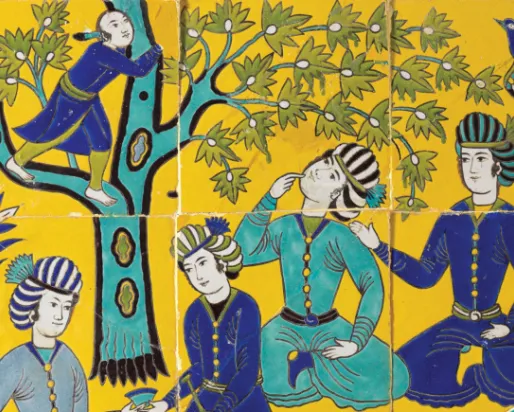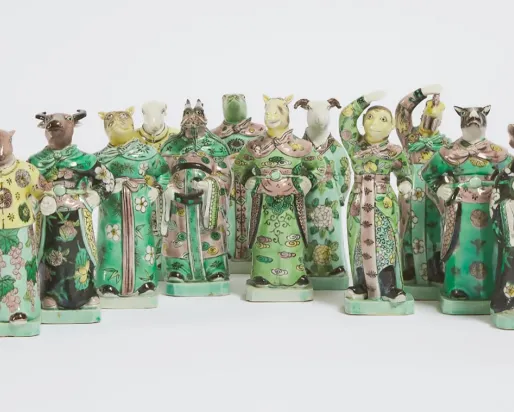Wildlife Photographer of the Year 2019
Date
Location
About

All-new photographs from around the world reveal striking wildlife, breathtaking landscapes, and the remarkable beauty of our natural world.
The longest-running and most prestigious nature photography competition in the world returns to ROM for the seventh year in a row.
Whether you’re a nature lover, aspiring photographer, or simply love a perfectly captured moment, you will appreciate the talent and technical expertise required to photograph such rare and surprising glimpses of the diverse life on this planet.
Descriptive Audio Tour
Download the transcript (PDF)
Wildlife Photographer of the Year 2019
Descriptive Audio Tour
Stop 1: Welcome
Welcome to Wildlife Photographer of the Year!
Organized by the Natural History Museum in London, England for the past 55
years, this is the oldest, most prestigious nature photography competition in the
world. We’re proud to present the exhibition at the Royal Ontario Museum for
the 7th consecutive year. I’m Burton Lim, assistant curator of mammalogy ― and
I’m honoured to curate this year’s first North American showing.
This year, over 48,000 images were submitted by professional and amateur
photographers, representing 100 nationalities. An internationally recognized
panel of 9 judges selected 100 of the best submissions for display in the
exhibition. They also awarded 19 category winners and 2 grand title winners as
the most memorable and striking. These images capture the fragility and beauty
of the natural world.
This exhibition is divided into 6 sections. Some sections feature single images,
exploring diverse themes such as: Animal Behaviours that enhance our
understanding of an animal’s life in the wild; Portraits that invite us to look closer
and gain new perspectives on the subjects; and Habitats that explore an animal’s
intricate relationship with its environment. Other sections feature collections of
images, including Photojournalism that convey compelling stories about the
natural world, and Portfolios that focus on outstanding images dealing with a
specific subject matter. My personal favourite is the Young Photographers
section, which showcases a new generation of visual communicators who are less
than 18 years old!
This descriptive audio tour highlights 12 photographs throughout the exhibition.
We selected them because their stories resonated with us, and we felt that they
were worth looking into with more detail. In addition to my voice, you’ll also hear
from Tina Weltz, a ROM photographer, and William Olenek, who won last year’s
ROM young photographer competition. Each stop is identified by a number on
the floor that you enter on your smartphone to get a deeper dive into the photo.
We’ll set the scene of the image and share some insights from the photographer,
but we will also offer other perspectives related to the biology of the wildlife and
how the picture was captured.
We hope you enjoy this guided tour and gain a new appreciation of our natural
world and the power of visual communication to inspire and stimulate the public
discourse.
Stop 2: Cool Drink by Diana Rebman
The exhibition begins with the Animal Behaviour section. The images here are
grouped into categories for birds, mammals, invertebrates, which are animals
without a backbone, and amphibians and reptiles. They capture scenes of the
ongoing struggles for survival in nature ― including predator-prey interactions,
foraging for food, and defending territory.
This image is named “Cool drink”, taken by Diana Rebman, an American, on the
island of Hokkaido in Japan. It’s a highly commended photo in the Bird Behaviour
category.
Here, a long-tailed tit is caught in mid-flight while momentarily hovering below an
icicle to take a bite off the icicle’s tip. Its white belly and the white underside of its
outstretched wings contrast starkly with the black on the front edge of the wings
and along the mid-line of the tail feathers. Also pure black are the feet, eyes, and
bill.
The long-tailed tit is a small bird with a body length of about 6 cm (or just over 2
inches) long. As alluded to by its common name, the tail is as long as, or longer
than, the body. It is a common species widely distributed across Europe and Asia.
This species remains active through the winter feeding on insects and spiders, but
is also known for nibbling at icicles to avoid dehydration. They usually flock in
groups of 20 and each will take quick turns at the frozen treat. And when the sun
comes out or temperatures rise a bit, the birds will start sipping the drops of
water as the icicle melts.
The photographer Diana Rebman endured extremely cold temperatures of -
20°Celsius (or -4°Fahrenheit) for hours on end ― coping with freezing cold finger
tips to take pictures of what she called a “well-choreographed dance” by a group
of long-tailed tits taking advantage of this icicle. Her secret weapon was a cable
release attached to the camera, which captured the special moment when her
fingers may have been too numb from the cold to react in time. The show ended
when one over-zealous bird clung to the icicle for a split-second too long and
broke it off.
Stop 3: The moment by Yongqing Bao
“The moment” is a photograph by Yongqing Bao from China. This image is the
Joint Winner of the Mammal Behaviour category. It captures the exact moment a
Tibetan sand fox surprises a Himalayan marmot emerging from a burrow. The
marmot is pirouetting on the ball of its left foot, turning away from the fox and
ready to bolt out through the right side of the frame. The fear on its face is
apparent. Its mouth is open and its front toes fully splayed. The fox is
momentarily startled, but its legs are bent and its body is low to the ground,
ready to pounce. Its head is cocked to one side with the eye eerily fixed on the
prey.
Both of these mammals are high-altitude species typically found above 3,000
metres (or about 10,000 feet) in elevation. They live primarily in grassy alpine
habitats. The Tibetan sand fox is active year-round, preying on small to medium-
sized vertebrates, which are animals with backbones, but also scavenging on
larger carcasses. The Himalayan marmot hibernates in a burrow during the winter
and emerges during the spring when the photo was taken. Although they are not
in the picture, this female fox had 3 hungry cubs to feed.
Yongqing Bao was trained in ecology, but is now a professional photographer with
the Qilian Mountains Nature Conservation Association of China in the heartland
of his subject species. Yongqing used a super-long telephoto lens (800mm) to
zoom into his scene. The aperture was wide open to let in as much light as
possible, and the background is kept blurry to concentrate on the showdown.
With this large lens, he needed a tripod to steady the camera, and used a fast
shutter speed to stop the encounter in mid-action without blurring. The detail is
amazing with the dew visible on the blades of grass and also kicked up into the air
during the surprise attack.
Stop 4: Tactile Panel
Have you ever wondered how photographers take dramatic close-up images of
animals in their natural habitats?
It depends on the type of camera lens the photographer uses. In this touchable
display, we compare two types of lenses – telephoto and wide-angle. Go ahead
and touch it!
On the left, you’ll find information on a telephoto lens. In the graphic in the
bottom left, we have the example of a 300 mm telephoto lens. Here it is used to
take a photo of a chipmunk 2 metres (or about 6 ½ feet) away, for a close-up shot.
This is very useful when you want to avoid disturbing the animal, or otherwise
cannot get close to it.
On the right, you’ll find another type of lens that can be used for taking close-up
photographs. This example is a 24 mm wide-angle lens. You can see or feel on the
graphic that this lens is much shorter than the one of the left. The wide angle lens
allows you to take an image when the subject is much closer, say if the chipmunk
is only 12 cm (or 5 inches) away from you. It’s a good choice when there’s an
opportunity to set up the camera without being intrusive or when you want to
take a photograph underwater, where light levels decrease quickly. Wide-angle
lenses are also good for landscape photography.
Both lenses can create beautiful images where the subject fills the frame. What
you use will depend very much on where you are, and how close you can get to
your subject.
Curious about the types of lenses the photographers in the exhibition used? On
the bottom right of each photograph, you’ll see a label with the technical
specifications. Look for the number measured in millimetres – this is the focal
length of the lens, which is the distance between the lens and the film or sensor
of the camera when the subject is in focus. If the focal length is higher than 60
mm, it’s most likely a telephoto lens, which means the photographer was far
away when they took the photo. In contrast, if the focal length is lower than 50
mm, that’s likely a wide-angle lens, which means that the photographer was very
close to their subject. What we see with our eyes is very similar to a camera with
a lens of 50 – 60 mm.
Stop 5: War dance by Victor Tyakht
“War dance” by Victor Tyakht from Russia is in the Amphibians and Reptiles
Behaviour category.
This image shows 2 toad-headed agamas caught in mid-stride, running and
bounding side by side in a competition over their desert domain. The lizards are
light brown, with enough variation in shades that they are still visible against the
sandy terrain. Their scaly bodies are speckled like the sand, but the tails have
ringed stripes ending in a dark tip. The agama on the left looks like it’s doing
push-ups while one hind leg kicks up sand. The one on the right is completely off
the ground, leaping in mid-air with its tail hooked around its competitor’s tail as if
to trip it up.
Toad-headed agamas are common in dry, hot habitats and are territorial lizards
that aggressively defend their desert environments. They will protect their
territory by racing around in competition and also curl their tails over their backs
in menacing poses reminiscent of scorpions. Agamas are insect-eating animals
that usually spend the hot day underground in burrows.
The photographer, Victor Tyakht, has put the viewer at eye level with these
reptiles. He used a fast shutter speed of 1/2,000 sec to freeze the frame with no
blurring. But what is also amazing with this shot is that Victor was holding the
camera free-hand without the benefit of a stabilizing tripod. It’s a head-on picture
filling the frame, so there was probably only one fleeting chance for this perfect
composition.
Stop 6: Lucky break by Jason Bantle
Hi, I’m Tina Weltz – photographer at the ROM. We are now in the Habitats
section and Urban Wildlife category.
This section starts with a really wild picture entitled Lucky Break, by Canadian
Jason Bantle ― in it, a raccoon has squeezed its head through a hole in the front
windshield of a car! I love this photo because the black masked raccoon is staring
directly at the camera with a look of, “What have I gotten myself into?” The
brown dilapidated vehicle is an early 70s Ford Pinto. Abandoned in a grassy field
near a forest, it needs a new paint job, the antenna is broken off, and half the grill
is missing, but the wipers and headlights still seem to be intact.
This image was captured in rural Saskatchewan, but everybody living in a North
American city, particularly in Toronto, loves to hate these masked bandits.
Notorious for strewing the organics from your green bin halfway across the lawn
every night, raccoons are just trying to eke out a living ― like everyone else. In
urban areas, some of them do get quite large and strut around the
neighbourhood as if they own it. They can also be found living in attics. But in the
wild, raccoons are smaller and leaner because food sources aren’t as readily
available. Here, they usually sleep in tree hollows or rock crevices. Raccoons are
quite adaptable with where they den and what they eat ― they are true
omnivores, able to consume just about any plant or animal matter.
For several years, the mother raccoon had used this car to raise her family, and
the photographer knew this. The only way in is through a hole in the windshield
big enough for the raccoon, but too small for a typical predator like a coyote. This
year, there were 5 young ones (or kits) in the back seat, which Jason could hear
playing around while he was in his hiding spot waiting for the chance to capture
this exact moment. At dusk, the mother had stuck her head through the hole to
begin her nightly foraging, but then momentarily stopped to survey the outside
scene. This opportunity of stillness enabled the photographer to use a slower
shutter speed (0.4 seconds) with a tripod, letting in the fading light to finally get
his crystal-clear shot of the humorous departure.
Stop 7: The challenge by Françoise Gervais
For the Animals in their Environment category, the photograph called “The
Challenge” by Françoise Gervais from Canada was chosen as a Highly Commended
image.
Set against the background of a rocky scree slope, in the lower right corner of the
frame is a lone polar bear ― looking like a white speck against a textured black
background. But there is enough detail in the image to see that the bear is in
mid-stride, trudging uphill with its left front leg reaching up to a rock as if to check
out the sturdiness of the next foothold. Its left hind leg is firmly planted on a rock
below… and, because we can’t see the top of the hill, we know that the bear still
has a long way to go.
Polar bears have been greatly impacted by climate change, and warmer
temperatures are decreasing the Arctic sea ice, which is essential for hunting seals
– its main food source. This species is a top-level predator in the marine
ecosystem. It’s also an iconic symbol for wildlife and has great cultural
significance to the Indigenous peoples of northern Canada. The photograph was
taken on Baffin Island in Nunavut. Due to climate change, polar bears need to
search for alternative food sources, including birds and their eggs. It’s estimated
that the polar bears on the island stay on land 20-30 days longer than 2 decades
ago.
Françoise Gervais, the photographer, was bobbing around in a boat trying to
steady herself for this image. Although using a telephoto lens, she wasn’t after a
zoomed-in photo of a picture-perfect polar bear, but rather wanted to
communicate a different message. Françoise says, “Even one of the most
impressive predators can look insignificant and vulnerable in the immensity and
inhospitality of this landscape.”
Stop 8: Sleep ing like a Weddell by Ralf Schneider
The photo “Sleeping like a Weddell” is by Ralf Schneider from Germany, and
appears in the Black and White Portraits category.
Here, a seal with mottled fur, white splotches on a dark short-haired body, lies on
its side with its eyes closed and front flippers crossed over its chest. A slight smile
seems to be creeping up at the corners of its mouth, as if it’s experiencing a deep-
sleep dream. The photo is tightly cropped from the torso to the head, which
contrasts sharply against the icy white background. The details of the ice suggest
that the seal has been there for a while because the contours of the body fit with
the smoothness of its cool bed.
The Weddell seal is found around Antarctica, the most southerly distribution of
any breeding mammal. It is a relatively large seal at about 3 metres (or 10 feet)
long and averaging 500 kilograms (or more than 1,000 pounds). These seals have
a thick layer of blubber that keeps them warm. Their primary diet is large fish,
and they can dive to 600 metres (or about 2,000 feet) and stay under water for
nearly one and a half hours.
Snapping pictures from a boat, Ralf Schneider used a telephoto lens to get a tight
shot of the seal snoozing on the ice. His portrait style gives a sense of personality
and intimacy to the seal.
Black and white photography is typically a stylistic choice made by the artist. By
choosing this monochromatic look, the image immediately has a strong impact.
Schneider’s control over the tonal range in this image is incredible ‒ it almost
gives the impression it’s a pencil sketch.
Stop 9: The wall of shame by Jo-Anne McArthur
Jo-Anne McArthur from Canada photographed “The wall of shame” in Texas,
which is part of the Wildlife Photojournalism category.
The focal point of this image is a brown snakeskin just slightly off-centre, pinned
vertically to a white wall. A snakeskin half the size appears in the upper right
corner. Stamped all around are 19 pairs of blood-stained handprints with the
signed names of the people who prepared the skins. Several of the prints are
small and probably from children.
Each year, the Sweetwater Rattlesnake Roundup in Texas – the largest such event
in the world – captures tens of thousands of rattlesnakes. After the heads of the
snakes are cut off, people can pay to skin them and then place their mark beside
their handiwork. Festival supporters claim it is important to control the
population of venomous snakes. But animal welfare groups argue it is cruel and
puts the long-term survival of rattlesnakes at risk.
The photographer, Jo-Anne McArthur, observes, “So many of the bloodied
handprints are those of children.” She finds this to be the most unsettling aspect
of the picture. This is the power of thought-provoking images. They make us stop
and consider how our actions can impact wildlife. We can transform the natural
world for better or for worse.
This photo of the controversial event was taken with a wide-angle lens not only to
capture the range of participation, but also to document the signatures.
Stop 10: The climbing dead by Frank Deschandol
“The climbing dead” was photographed in Peru by Frank Deschandol from France
and appears in the Plants and Fungi Environments category.
In this image, three antenna-like projections sprout from the body of a long-
snouted beetle called a weevil. The weevil is clinging to a green plant stem at the
bottom centre of the frame. The frontal shot makes the bulbous, orange-tipped,
black-stalked projections look like a pitchfork. The insect’s glazed, black eyes
indicate it’s dead. The real antennae of the weevil are bent on the head, looking
like legs. But the 3 pairs of actual legs come from the underside of the body ―
progressively out of focus in the photo, and clamped onto the stem.
Beetles and ants are known to be attacked by Zombie fungus. Feeding on the
innards of the insects, these parasites slowly kill their hosts who finally stop
moving – literally dead in their tracks, locked onto vegetation. After using up the
food supply, the fungus sprouts from the exoskeleton of the insect ― emerging as
long external fruiting bodies with capsule-shaped tips. These eventually burst and
release millions of tiny spores to infect new prey with the aid of wind.
Photographer Frank Deschandol spotted his bizarre discovery at night in the
Amazon rainforest. He knew the weevil was already dead and would therefore
still be there the next morning when natural light would be better. This situation
also allowed him to use a long exposure of 1 second to soften the background.
He used an aperture setting of f5.6 for a depth of field that focused on the head
of the weevil and the bright orange rounded tips. The thorax section of the body
and the base of the antenna-like projections protruding from it are all out of
focus.
Stop 11: Humming surprise by Thomas Easterbrook
Hi, my name is William Olenek and I was last year’s winner of the ROM Youth
Wildlife Photographer of the Year award. I will show you some awesome pictures
from the Young Photographers section, which has three age categories under 18
years old.
The first photo is by Thomas Easterbrook from Britain, the winner of the 10 years
and under category. He took this picture in France and named it “Humming
surprise.”
This close shot shows a greyish-brown moth with blurred wings flapping away to
keep it suspended in air. Its long, thin, straw-like mouth part is bent at a right-
angle, dipping into a flower for some sweet nectar. The bright red flower rises
from the lower right corner of the picture. The green background is out of focus,
giving a nice colourful palette.
Moths usually fly at night, but hummingbird hawkmoths are different because
they fly during the day. They also see better than other moths. This hawkmoth
looks like a hummingbird flying and is easily mistaken for one. In addition, you
can hear a hum when the wings beat fast (around 85 times per second). Its
resemblance to the hummingbird’s appearance and sound gave this moth its
name.
The humming noise is what captured the attention of the Youth Photographer
Thomas Easterbrook to this moth. He waited and watched as it sipped nectar
from different flowers. Finally the moth got close to him, and he was ready. He
pulled the shot off not only by filling the frame with both hawkmoth and flower,
he also captured the body in focus with blurry wings― just as it was taking a
drink.
Stop 12: Night glow by Cruz Erdmann
In the 11-14 Years Old category, “Night glow” was the winning photo by Cruz
Erdmann from New Zealand.
A colourful squid fills this picture, with the darkness of the ocean as a backdrop.
The squid is swimming from the upper left to the lower right of the photo. It is
iridescent, with gold spots covering most of its head and arms, and wrapping
around its body in bands. Glowing patches of blue appear throughout its entire
body with two thin fins along the length. One large eye is surrounded by blue,
while the top of its head has a splash of green. Below, 4 small arms and 4 large
arms extend forward.
Bigfin reef squids are common in the Indian Ocean and western Pacific Ocean.
They are also commercially fished for human consumption. These squids have
complex patterns of colours produced by pigmented and reflective skin cells,
which they can voluntarily control. During mating, their colour patterns become
distinctive to indicate a willingness to partner up. Posturing is also involved in
courtship rituals.
Cruz Erdmann was diving with his father one evening when he saw this bigfin reef
squid. Using specialized underwater housing for his camera, he was prepared for
anything in Lembeh Strait off of North Sulawesi in Indonesia. A strobe light
enabled him to take 4 photos before the squid swam off into the black expanse of
the sea. With a high aperture, Cruz managed to get the complete animal in focus.
Its vibrant colours light up this nighttime image.
Stop 13: Early riser by Riccardo Marchegiani
The winner of the 15-17 year-old category is Italian Riccardo Marchegiani’s photo
called “Early riser”.
Here, a female gelada monkey is walking on all four legs along the edge of a cliff.
Her baby’s head is just visible, poking out from the comfort of the mother’s chest
as she strides forward. The infant looks directly at the camera while the mother
warily eyes the photographer, an intruder in her territory. A baboon-like primate,
this monkey has a coarse scruffy coat of dark brown fur, with some light brown
patches on the underside, upper legs, and the base of her tail. Her face is bare
and leathery.
Gelada monkeys live only in the grassy highlands of northern Ethiopia. At night,
they descend over cliffs to sleep on ledges for safety. During the day, these
monkeys spend most of their time socializing and grazing on their primary diet of
grass. A baby spends its first month clutching the mother’s chest. It then moves
onto her back until about a half year old, when it can move around on its own.
Gelada populations have been declining over the years and their habitat is being
reduced by the expansion of agricultural areas.
Teenage photographer Riccardo Marchegiani staked out his position before
sunrise in the hopes of seeing geladas waking up to go to their feeding grounds.
His perseverance paid off and the baby was an added bonus. He captured a close-
up of the pair with a wide-angle lens ― and used a flash on low power to add a
bit of pop, so they would stand out from the mountain ranges in the background.
Stop 14: Fluff formation by Stefan Christmann
We conclude our tour with a photograph by Stefan Christmann from Germany,
who won the Wildlife Photographer Portfolio Award for a collection of 6 images.
The photo we’ll be focusing on is titled “Fluff formation”.
In this photo, about 50 emperor penguin chicks tightly huddle with their heads
bowed down to conserve heat. But one, then another, break formation by raising
their heads above the masses. Their backs are grayish white, with clumps of
condensed ice particles visibly forming on their feathery down. They have black
heads with a white mask around the eyes and under the mouth.
When chicks are about 2 months old, their parents go hunting for fish to feed
them, often swimming up to 500 km (or 300 miles) before coming back. While
the adults are away, the chicks instinctively cluster together to stay warm in the
bone-chilling Antarctic weather. But they don’t have the experience of age to
know how to gather most efficiently and keep their heads down like their parents
do … since kids will be kids no matter what the species, a few will always break
the rules and raise their heads above the cluster. Parents locate their young by
recognizing their unique vocalizations ― then regurgitate a meal to them.
Taking pictures in Antarctica exposes a photographer to some of the most
extreme conditions in the world. Temperatures can drop below -40 degrees
Celsius (the same in Fahrenheit). Stefan Christmann says, “When I took off my
gloves to focus the lens, the cold felt like needles piercing my fingertips.”
Nevertheless, he did not use a tripod to take this picture, and set the shutter
release at the slowest speed suggested for hand-holding a camera.
Thanks for visiting Wildlife Photographer of the Year! We hope you enjoyed the
exhibition, and the rest of your visit to the ROM!
Highlights
The Competition
The Wildlife Photographer of the Year competition is now in its 55th year and attracts tens of thousands of submissions from photographers of all ages and skill levels.
Reflecting on the astonishing diversity of our natural world, competition categories include Animal Portraits, Urban Wildlife, Behaviour of Birds, and Under Water, while a hard-hitting documentary section features two photojournalism portfolios.
With the winning photographs selected for their artistic composition, technical innovation, and truthful interpretation of the natural world, the exhibition showcases the winners and finalists whose work calls attention to the beauty and fragility of this world.
Awards and Recognition
Winning the Wildlife Photographer of the Year competition is the highest level of recognition for wildlife photographers. Judged over two rounds by a jury of international experts, competition finalists and winners are announced at an awards ceremony hosted at the Natural History Museum in London, where photographs are premiered in a major exhibition before embarking on a world tour.
Wildlife Photographer of the Year offers photographers an internationally acclaimed platform to showcase their work, while celebrating and calling attention to our beautiful and precious Earth.
Partners & Sponsors
Wildlife Photographer of the Year is developed and produced by the Natural History Museum, London.
